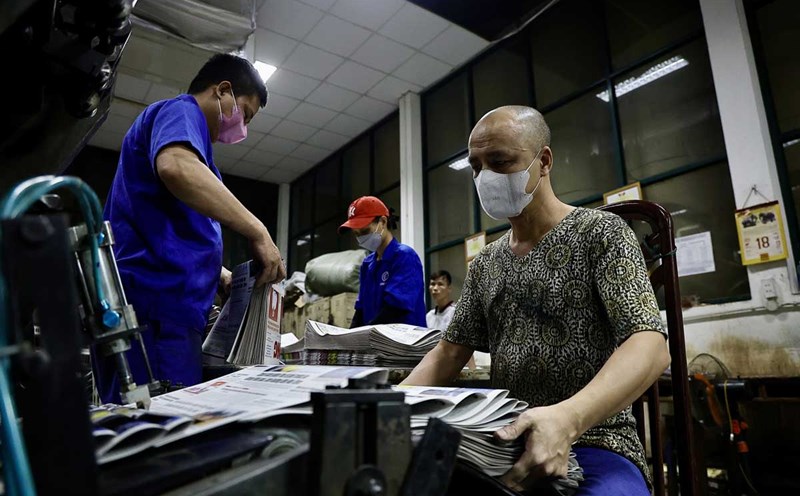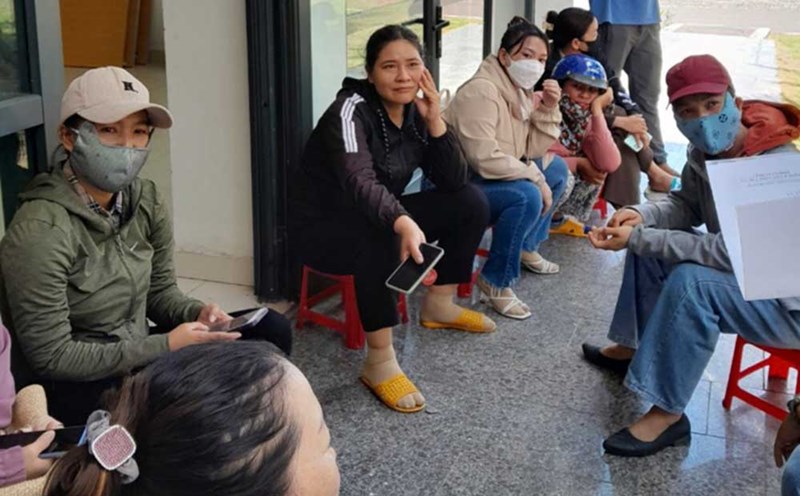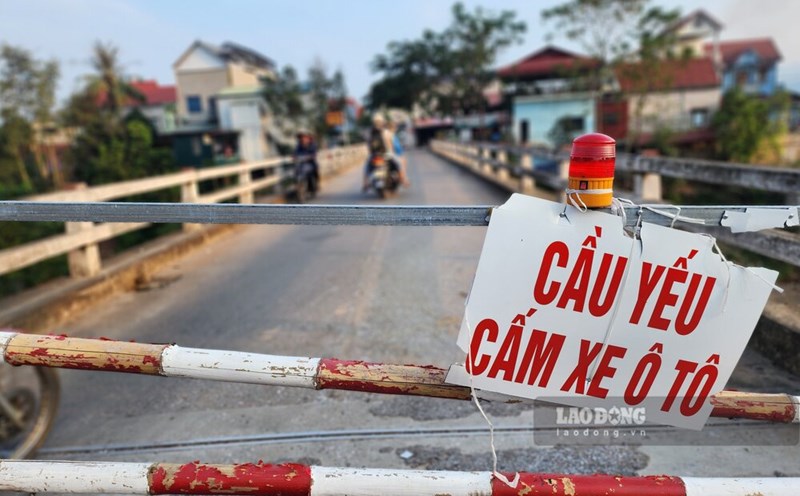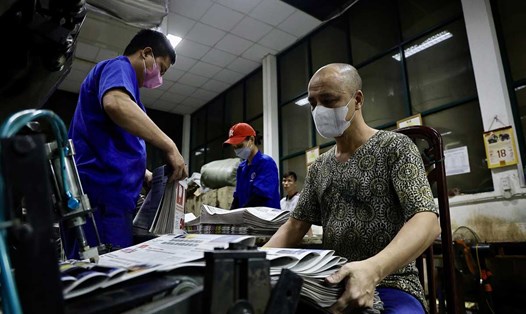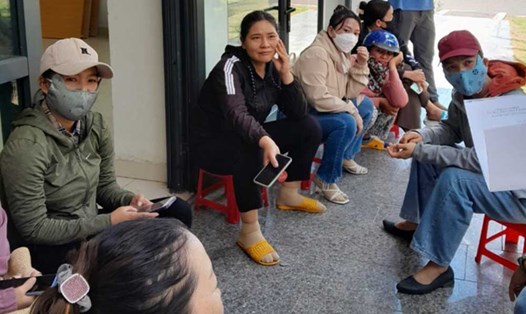Journey to find Lao Dong Newspaper No. 1
Mr. Do Van Phu - former Chief of the Office of Lao Dong Newspaper said that in 1999, when assigned to be the Acting Chief of Office of Lao Dong Newspaper, I participated in the process of organizing the 70th anniversary of publishing the first issue of Lao Dong Newspaper ( August 14, 1929). At the same time, the newspaper's leaders advocated a plan to compile and publish the book "70 years of Lao Dong Newspaper" - a book recording the main features of the newspaper's history, and publish the book " 70 years of Lao Dong - examples of the newspaper". "face" introduces the faces and articles of the newspaper's writers. From there, I came up with the idea of finding Lao Dong Newspaper No. 1 published on August 14, 1929.
“Having some experience in investigation and document retrieval, I was confident in getting involved. First, I went to the Central Archives to ask for help, but to no avail. I think Lao Dong Newspaper is associated with revolutionary propaganda activities, surely documents from French secret police must be there. With a familiar relationship, I went to the Records Department - General Department of Security - Ministry of Public Security. The department's leaders welcomed him enthusiastically and promised to try their best to search the archives. When they met again, they sadly shook their heads.
I thought again: The comrades who led the activities were arrested, tried, and imprisoned. Surely some of them were carrying revolutionary documents that had not yet been destroyed. Who knows, maybe even the Lao Dong Newspaper? Are documents for the trial stored at the Court? I went to the Supreme People's Court. But unfortunately, here, I also received the answer: No.
Not discouraged, I continued to go to the Museum of the Revolution to ask for help. The museum has many precious artifacts, but there is no newspaper Lao Dong No. 1. It's almost the anniversary, so why give up?
A thought suddenly flashed. Why not go to the Archives of the Party Central Office? With the help of the department's leaders, I met Mr. Long, Head of the Operations Department. He accepted the invitation. A week later, he called to announce the results. So happy, I rushed to meet him. He gave me a photocopy of Lao Dong No. 1 and Lao Dong No. 4. There's nothing more fun than that. I held the A4-sized copy of the newspaper and was filled with emotion. Say goodbye to Mr. Long and be extremely grateful to him.
I confided in Mr. Hung - Head of the Revolutionary Museum. He looked at it and thought that this was a priceless artifact that could be restored on A4 sized Do paper. I immediately photocopied and gave him both sheet number 1 and sheet number 4, asking for his help. Just over a week later I had sheet number 1 and sheet number 4 looking exactly like the originals. This digital content reports on the first Congress of Delegates of the Northern Labor Union General Conference that took place on July 18, 1929" - Mr. Phu said.
The entire front page of No. 1 of Lao Dong newspaper is as follows:
“Proletarians of the world unite!
Full-term representative of the first congress of the Tonkin Labor Union General Assembly.
On July 28, 1929, the Provisional Executive Committee of the Tonkin Labor Union General Assembly convened the first full-term congress.
At exactly 7:30 a.m. when the festival opened, Mr. B., a representative of the Provisional Executive Committee of the Bac Ky Labor Union of the General Assembly, stood up to introduce all the brothers.
In the congress there were delegates from the general congresses of Hanoi, Nam Dinh, Hai Phong and Dong Trieu. As for the General Assembly of Bac Ninh, Dap Kau, and Cam Pha, they have not yet finished arranging their work and have not sent delegates back, nor have they authorized the Executive Committee.
Then Mr. B. gave an opening speech saying:
- We proletarians cannot tell each other, we cannot do anything, this congress is an obvious testimony to dispel that doubt. The recent strikes in Hanoi, Nam Dinh and Hai Phong have claimed few rights and have left the imperialists and capitalists in shock. This entire congress of delegates proved to be very steadfast, certainly our proletarian brothers and sisters know how to unite and know how to fight against the capitalists and imperialists who oppress and exploit them. we.
We unite together to fight fiercely because we have suffered so much that we cannot bear it anymore, our work is still in its infancy. Our path is still long, so the responsibility of this congress is very great. We hope that all of you will discuss as much as possible so that the work can move forward quickly. In addition, there will be consultants here to discuss the work. For us, we can be sure that after this congress, the power of our proletariat will expand."
It must be understood that in the context of secret operations, printing using clay, every time 20 copies are printed, the text begins to fade, and after printing and distributing, the birth of the No. 1 Lao Dong newspaper is a miracle. .
Now, newspaper No. 1 has become a valuable document for the generation of Lao Dong Newspaper workers.
Writing reports under rain of bombs
Journalist Nguyen Tien Chuoc, former Head of the News, Politics and Internal Affairs Department of Lao Dong Newspaper, also shared unforgettable memories during the days when American planes fiercely bombed the North.
“In 1972, the US air raid in the North of our country was extremely fierce; At that time, I was a resident reporter in 3 provinces: Vinh Phu, Yen Bai, Lao Cai, but did not have a fixed office, but often "relyed" on agencies in Viet Tri, usually the Vinh Cultural Department. Phu. Being in charge of such a large area, I am rarely at home. Every time I come back, I read a bunch of letters from family and friends. I once received a letter from an unfamiliar girl sent to Vinh Phu Cultural Office. She introduced herself as having studied at university in the Soviet Union and recently returned home, and is currently living with her mother in T commune, L district.
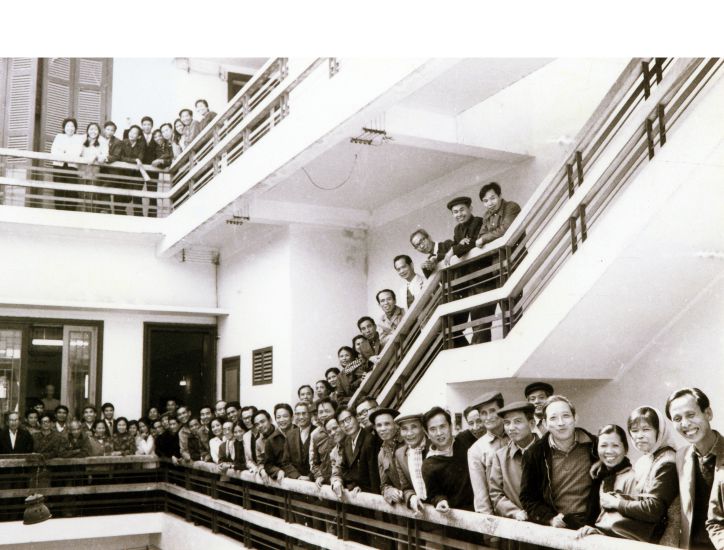
The letter was several pages thick on student paper, the words were loving and passionate, showing that the writer was "cultured" and even a somewhat amorous girl... Later (she probably asked someone ) knowing that I was not an officer of the Cultural Department but a resident reporter, her letters to me became more and more frequent, appearing closer. After receiving a few of her letters, I only wrote a very general reply, timidly because maybe someone was planning to "test" me. In the last letter, she invited me to visit her house in the near future.
"When you come, remember to ask for Khong Thi Sau's address, village, commune... I'm always waiting for you." On a free day in mid-June 1972, I decided to be "curious" to see the stubborn girl. What kind of person is this because after many letters she still only addresses me and refuses to address her like many other girls. I arrived in the afternoon, but before entering the house, I asked the students if there was Ms. Khong Thi Sau in the village.
Six is a good-looking girl with a slim and gentle body; His eyes shone with intelligence. Although she is a girl of rural origin, Sau appears to have good communication skills, openness and sincerity. She read many books of Russian literature and French literature that were translated into Vietnamese at that time. Her mother - a widow in her 50s, the wife of a martyr during the war against the French - is also a very approachable person. Honestly, even though I just met this girl for the first time, I really like this girl. After more than an hour of chatting, Sau and his mother turned to make dinner and invited me to stay for dinner. No matter how I refused, I couldn't help but "obey" and rolled up my sleeves to pick vegetables. rip; Seeing that, Sau and her mother kept smiling at each other...
The meal was being served when several groups of American planes thundered in from the west. They aimed at the Viet Tri bridge and raced to launch missiles like orange lightning. I had a hunch that Viet Tri bridge would not be safe during this bombardment, so I had to excuse Sau and her mother and return to Viet Tri to work. She and her mother tried to keep me here because they did not understand the nature of my work, and even thought that I was "making a big deal" of things. Her mother laughed and said: "What does it have to do with journalists if the Viet Tri bridge unfortunately collapses?"; But then seeing that I insisted on going, she and her mother had to give in. Sau sent me to the village, tears in his eyes...
Just as I predicted, Viet Tri bridge was cut off by homing missiles. Traffic assurance units are rushing and urgently preparing vehicles such as ferries, canoes, and operators to bring people and vehicles across the river in the spirit of "Always keep traffic arteries clear" Seeing the situation With such hot water, I immediately followed the combat units and the comrades who commanded the units to interview and get documents for the reportage that was brewing in me. At 12 o'clock that night, the first ferry connected the two banks of the Lo River instead of the Viet Tri bridge that was temporarily out of operation.
In life sometimes there are random things. On that first ferry, in addition to several military vehicles, there was also a car carrying comrade Nguyen Duc Thuan - Member of the Party Central Committee, Chairman of the Vietnam General Trade Union - to inspect the situation of ensuring traffic safety on the southbound route. North. Comrades praised and praised the spirit of urgency to ensure smooth traffic of the workers and employees of Viet Tri ferry terminal. After that, I, the captain and deputy wharf, went back and forth on many more ferries to learn from experience, overcome shortcomings, and ensure the fastest time for each ferry before leaving; It was 4 am.
Resting for a few minutes, I started writing about the above event. It should also be added that, as an inter-provincial resident reporter, I was prepared to approach key points where the enemy could attack, so I was not too surprised by this bombardment. At 9:00 a.m. that morning, the reportage "Noi Ben" was finished. I quickly went to Viet Tri station and asked a soldier comrade (of course I didn't know him, but I always trusted soldiers) to deliver the article to a certain mailbox in Hanoi. A few days later, the reportage "Noi Ben" was solemnly printed in Lao Dong Newspaper. I am happy because I have fulfilled my duties as a resident reporter well and there is also a reason for Sau and her mother to be more understanding because of my hasty departure last time.
Holding the newspaper with my article in his hand, Sau was extremely grateful: "I thought journalists were very free people, not bound by anything, but I didn't expect that you journalists have to comply with discipline." and such strict responsibility...".
Cannot report superficial news
As for journalist Truong Dang Lan - former Head of the Lao Dong Newspaper Representative Office , he told an interesting story about the profession: "That year was 1991, when Sunday Lao Dong had just entered its second year, it was still very young. One day, I was assigned by my boss Truong Anh Dung (common name Tam Dang), who was then Deputy Editor-in-Chief, to attend a conference held by the Ministry of Construction in Vinh Long province. A business trip is like any other trip, nothing worth mentioning, if no incident occurs.

The incident was, the inviting party made an appointment to pick up the reporter at 5:00 a.m. at headquarters at 120 Nam Ky Khoi Nghia, District 1, Ho Chi Minh City. I carefully arrived at five minutes to five. But time keeps passing. 5:00, 5:10, then 5:30, 6:00... no one came to pick me up. At that time, very few people had cell phones, so there was no way to contact the car. I looked at the invitation again and saw that the conference content was not important. At best, even if I went, I would only post news. I thought to myself, if they let me "climb the tree", then I don't need them. The best solution is to wait until the evening. In any case, after the conference is over, the ministry officials will have to return to Saigon. At that time, it wasn't too late to get the news back (that year Lao Dong only released 2 times/week). Thinking so, I leisurely stopped by the coffee shop in front of the agency gate, waiting until 8 o'clock, when the agency leaders came for a briefing to report on the "firefighting" plan.
At 8:05, I knocked on the conference room door. Just reported a sentence, saying: I arrived at 5:05, waiting until now there is still no one to pick me up..., Mr. Tam not only did not bother to share but immediately threw me a bucket of cold water: "Who knows you?" Come at 5 o'clock or 6 o'clock! Then he ordered: “Whatever way is up to you. I need Lao Dong reporters present at the conference!”. At this point I was really stunned. Everyone at the agency knows that Mr. Tam has a fiery temper, and when he gives orders, his subordinates are only willing to carry them out. But how to do this? The route from Ho Chi Minh City to Vinh Long is over 130 kilometers, you have to go through a ferry, there are only 2-3 bus trips a day, and the conference is only limited to the morning. It was easy to get there, the meeting had already ended…
I know that, but I have no choice but to go, completely out of reluctance. A colleague knew about it and helped me by taking his motorbike to Cho Lon bus station. When we arrived, the Vinh Long bus had just left, the next trip wouldn't be until noon. I hurriedly went to find another bus. I had to jump on the bus to go to Long An and continue thinking. From Long An, I had to take a few more buses, including a trip on a Honda bus, which was very popular in the West at that time. On the way, I was worried about not being able to make it on time, and mumbled and complained to my boss for unnecessarily sending reporters.
I finally managed to get to the conference location at 12 noon. And fortunately, there was time for the Deputy Minister of Construction to summarize the conference. I sneaked into the last row of empty seats and quickly opened my notebook to take notes. Suddenly I remembered a humorous poem at that time about the conference program: "First, approve the program - Second, report on the situation of the past year - Third, set directions - Fourth, summarize , year is the festival”. So I was present for two out of five parts of the conference, and importantly, I met the boss's requirements!
Entering the festival dining room, the organizers discovered that a reporter from Lao Dong Sunday Newspaper was present. The southern representative of the union ministry came to me and apologized profusely for the negligent driver who forgot to pick me up. He also "speaks" in front of everyone at the dinner table that the Sunday Lao Dong newspaper has only been published for a short time but is very good and is of interest to many officials and employees of his industry. And he concluded: "To have reporters like this enthusiastically sticking to the base, it's a must for a good newspaper." My nose widened when I heard it. In my heart, I almost erased all the resentment and frustration about my boss from this morning until now.
Thanks to the trip, I was able to write a news article about the conference. And then from the information here, I went down to the grassroots to write a series of articles about the real life situation of workers on construction sites. More importantly, since then I have created a very good relationship with the Southern Ministry of Construction Union. This is a clue that will help me with a lot of information later. From the trip, I also learned lessons for my profession. That is not to be superficial, to get things done, to get by, to stick close to the base. Once you have firmly grasped the base, many good problems will arise. And I silently thanked the boss that I previously thought was too strict and full of reporters.
Up to now, I see that the lessons I learned are still valid in journalism. Because currently there is still a situation where reporters are lazy to go to the facility, do not go to the field but at home still imagine writing articles; The situation of going to meetings only to get documents is changing; The situation of sharing news and articles for each other...If you do journalism like that, you will never have good news or good articles, not to mention that it is very easy to make mistakes."

